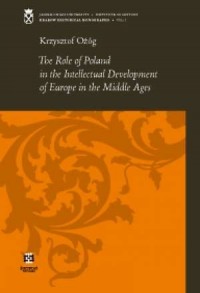The role of Poland in the intellectual development of europe in the middle ages
Krzysztof Ożóg

| Dane szczegółowe: | |
| Wydawca: | Societas Vistulana |
| Rok wyd.: | 2009 |
| Oprawa: | miękka |
| Ilość stron: | 232 s. |
| Wymiar: | 165x240 mm |
| EAN: | 9788361033363 |
| ISBN: | 978-83-61033-36-3 |
| Data: | 2010-01-22 |
Opis książki:
Publikacja w języku angielskim, będąca wynikiem kilkuletnich badań uznanego naukowca i wykładowcy, specjalizującego się szczególnie w tematyce, o której niniejsza książka traktuje. Rozprawa jest gruntownie udokumentowana źródłami i literaturą przedmiotu. Poświęcona została uczonym z ziem polskich w średniowieczu, których dzieła i dorobek wpłynęły na rozwój intelektualny Europy. Część I pomyślana została jako szeroki kontekst dla rozważań prowadzonych przez autora w części II - przedstawia narodziny i funkcjonowanie środowisk naukowych w średniowiecznej Europie oraz główne linie rozwoju średniowiecznej nauki europejskiej. W części II autor przybliża najpierw postaci uczonych pochodzących z ziem polskich, którzy działali w najważniejszych środowiskach uniwersyteckich od XIII po początek XV wieku i tam tworzyli swe dzieła, które doczekały się szerokiej recepcji. W dalszej części rozprawy omówione zostało powstanie środowiska naukowego w Krakowie po odnowieniu Uniwersytetu w 1400 r. oraz jego dorobek intelektualny, który nabrał wagi na miarę europejską (w dziedzinach prawa, teologii, filozofii przyrody oraz astronomii). Swoje miejsce znalazło w książce też omówienie udziału polskich uczonych w debatach naukowych, toczonych w XV wieku na soborach powszechnych oraz w europejskich.
Książka "The role of Poland in the intellectual development of europe in the middle ages" - Krzysztof Ożóg - oprawa miękka - Wydawnictwo Societas Vistulana. Książka posiada 232 stron i została wydana w 2009 r. Cena 20.55 zł. Zapraszamy na zakupy! Zapewniamy szybką realizację zamówienia.
Spis treści:
I. The Intellectual Development of Europe in the 12th–15th Centuries
1. The Birth and Development of the Universities of Bologna and Paris — the European Intellectual Centres (1.1. Law Schools of Bologna
1.2. The University of Paris — the Philosophical and Theological Centre of Europe)
2. Formation of the European Intellectual Centre in Oxford in the 13th and 14th Centuries (2.1. The Founders of the Oxford Franciscan School
2.2. The Intellectual Influence of the Oxford Academic Milieu on the University of Paris in 14th Century)
3. The Development of the University Movement in Europe in the 13th Century — Formation of Minor Intellectual Milieus (3.1. Formation of the University Network
3.2. Studia Generalia of the Mendicant Orders in the Intellectual Geography of Medieval Europe
3.3. A Manuscript Book as the Basic Tool for Intellectual Work of University Milieus)
4. Intellectual Development of Central and East-Central Europe in the 14th–15th Centuries (4.1. Central and East-Central Europe under the Influence of Bologna and Paris
4.2. Formation of the First Universities in Central and East-Central Europe in the 14th Century
4.3. The Influence of the Western Schism and the Hundred Years’ War on the Crisis of Parisian Milieu and the Intellectual Intensification of Central and East-Central Europe
4.4. Prague as the Most Important Intellectual Centre of Central and East-Central Europe
4.5. Doctrinal Trends at Universities of Central Europe in the 14th and 15th Centuries
4.6. Humanism in Central and East-Central Europe in the 15th Century and Early 16th Century)
II. Intellectual Achievements of Polish Intellectuals, Significant for Europe in the Middle Ages
1. Intellectuals from Piast Lands in the European Intellectual Milieus in the 13th and the First Half of the 14th Century
2. Polish Intellectuals at the Universities of Prague and Heidelberg and Their Influence on the European Thought
3. Formation of the Krakow Intellectual Milieu (3.1. Foundation of the University of Krakow
3.2. Reception of the European Intellectual Achievements by the University of Krakow
3.3. The University of Krakow and the Hussite Movement)
4. European Intellectual Achievements of the Krakow University Milieu (4.1. The Krakow School of International Law
4.2. The Church Reform and Conciliarism in the Writings of Krakow Intellectuals in the Panorama of the European Culture
4.3. Krakow Intellectuals’ Achievements in Maths, Astronomy and Geography in the 15th Century and the Early 16th Century
4.4. The Collapse of the International Status of the Krakow Intellectual Milieu in the Second Quarter of the 16th Century)
Conclusion
Bibliography
Index of Persons

